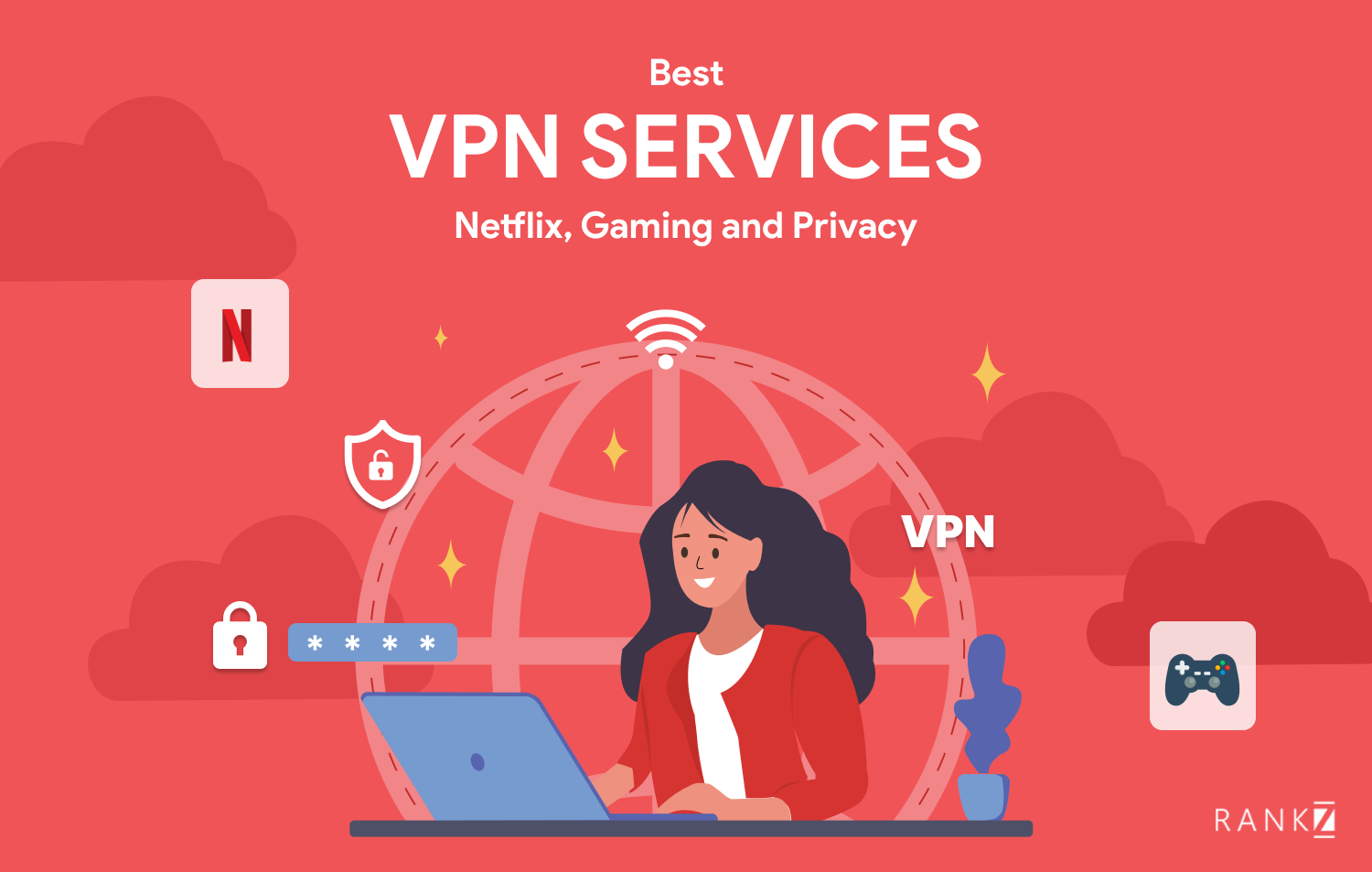For good reasons, virtual private network (VPN) services have become increasingly popular in recent years. Today, people all over the world are trying to find the best VPN service provider to increase their online privacy, security, and safety.
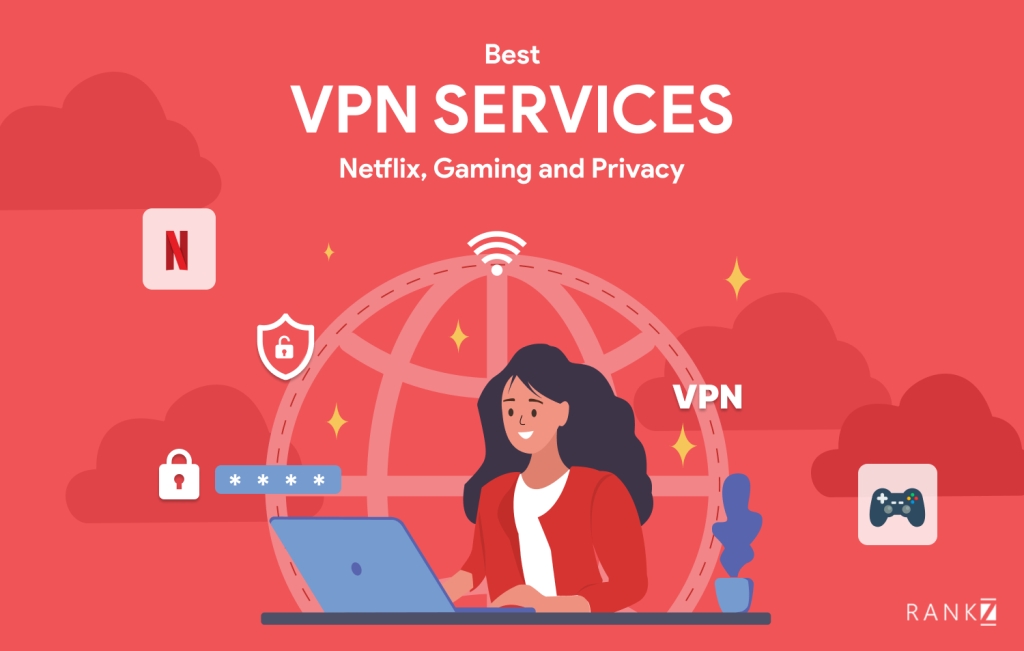
VPNs (virtual private networks) have become mainstream because people want more privacy, better protection on public Wi-Fi, and more control over where their traffic appears to come from online. A good VPN encrypts your connection, reduces tracking, and helps protect sensitive activity like logins and payments when you’re on untrusted networks.
This guide breaks down what a VPN is, how it works, what to look for, and the best VPN services in 2026—with Surfshark as the #1 overall pick for most people thanks to its mix of coverage, ease of use, and unlimited-device value. Surfshark advertises 4,500+ servers in 100 countries and support for unlimited devices on one plan.
Best VPN services at a glance
Surfshark – Best overall value for most people (unlimited devices, huge coverage)
NordVPN – Best for security-first users and advanced features
ExpressVPN – Best for simplicity + premium performance
CyberGhost – Best for beginners + long money-back window
Private Internet Access – Best for customization and power users
Proton VPN – Best free VPN option (unlimited data) + strong privacy
Hotspot Shield – Solid all-in-one option (especially for casual users)
What is a VPN?
A VPN (Virtual Private Network) creates an encrypted “tunnel” between your device and a VPN server. Your internet traffic goes through that tunnel, which helps protect it from snoops on public Wi-Fi and makes it harder for third parties to profile your activity.
A VPN can also make it look like your traffic is coming from another region because your browsing exits the VPN server you choose.
What does a VPN do and when should you use one?
A VPN is most useful when you want:
- Safer browsing on public Wi-Fi (cafes, airports, hotels)
- Reduced tracking and better privacy from ISPs and networks
- More consistent access while traveling
- Extra protection for sensitive logins (email, banking, work dashboards)
A VPN is not magic: it doesn’t make you “invisible,” and it doesn’t guarantee anonymity. But it’s a practical layer of protection for everyday internet use.
How we ranked the best VPN services
To create a list that’s actually useful (and not fluff), these factors matter most:
- Security basics: modern protocols, kill switch, strong encryption, DNS leak protection
- Server coverage: number of countries/locations (helps stability + travel use)
- Speed & reliability: consistent performance during real use
- Streaming and travel use: ability to keep working when networks are restrictive
- Device support: how many devices per subscription
- Refund policy / trial: risk-free testing window
1) Surfshark (Best overall VPN in 2026)
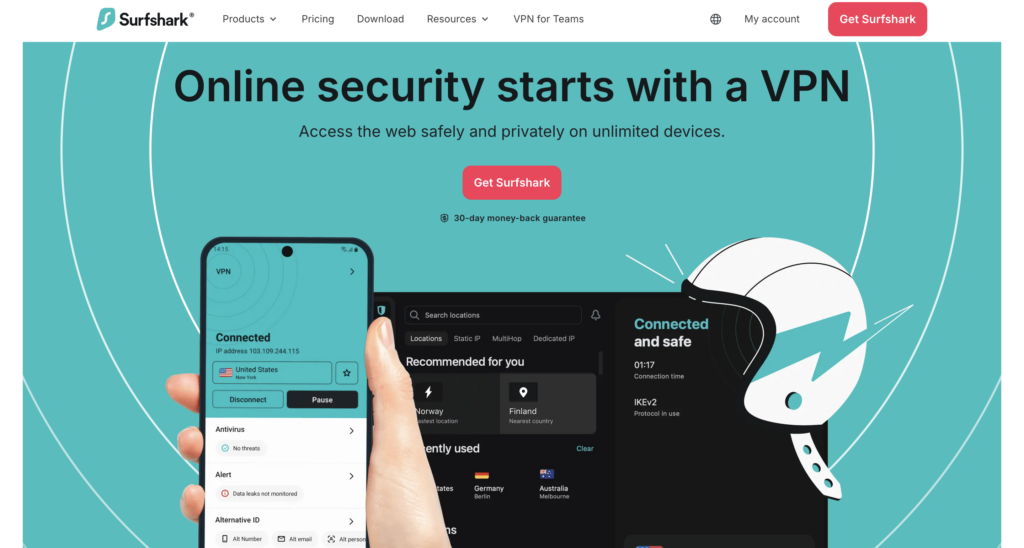
Surfshark takes the top spot because it delivers the best “most people” package: big global coverage, simple apps, and unlimited devices on one plan. Surfshark’s own server list states 4,500+ servers in 100 countries, and its support docs also reference 4,500+ servers in 100 countries (updated Dec 2025).
Why Surfshark is #1
- Unlimited devices on one subscription (excellent for families/teams)
- Massive coverage: 4,500+ servers in 100 countries
- Risk-free testing: 30-day money-back guarantee
- Strong “everyday” features like split tunneling, MultiHop, and ad/tracker blocking are commonly highlighted in independent reviews
Best for
- People who want one VPN for phone + laptop + TV + family devices
- Frequent travelers
- Anyone who wants strong privacy without a complicated setup
ExpressVPN
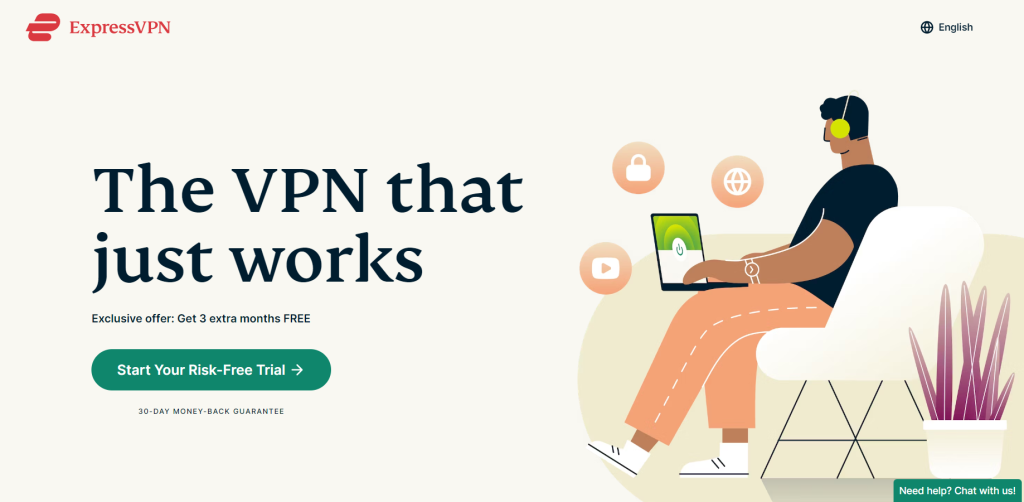
ExpressVPN is one of the best VPN services you can use. With over 3000 servers in 94 countries around the world, you have access to more than half of the world’s major countries. It utilizes industry-recognized AES-256 encryption to secure your data, making it best-in-class.
ExpressVPN is built with innovative server-based technology that eliminates the need to save data on your computer’s hard drive. It also comes with built-in split tunneling. This VPN service allows you to stream high-quality video at lightning-fast speeds and connect up to 5 devices at once.
With its round-the-clock live chat assistance, you get real people to assist and respond to your questions all day. ExpressVPN comes with a 7-day free trial and a 30-day money-back guarantee.
NordVPN
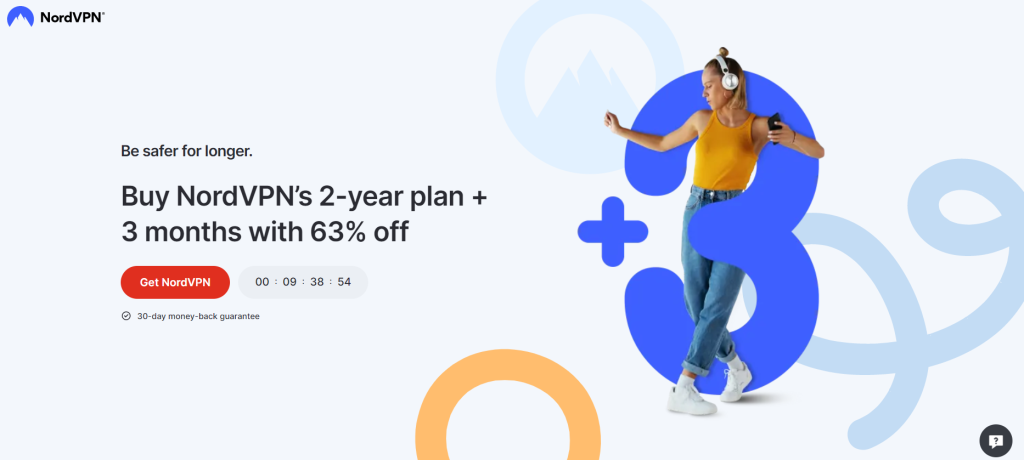
With 5,500+ servers across 60 countries, you won’t have any problems using NordVPN. It’s very simple to use and very user-friendly. NordVPN supports split tunneling, and you can get your server up and running in seconds! With NordVPN, you can connect up to 6 devices at a time.
NordVPN has an advanced threat protection function that can block those ads that disrupt the flow of your work, automatically check your downloads for malware, block suspicious websites, and a lot more. They also have quick and responsive live chat and email services to help out at any time.
NordVPN offers a 7-day free trial to all new Android users and a 30-day money-back guarantee for iOS, MacOS, Windows, and other platforms.
CyberGhost
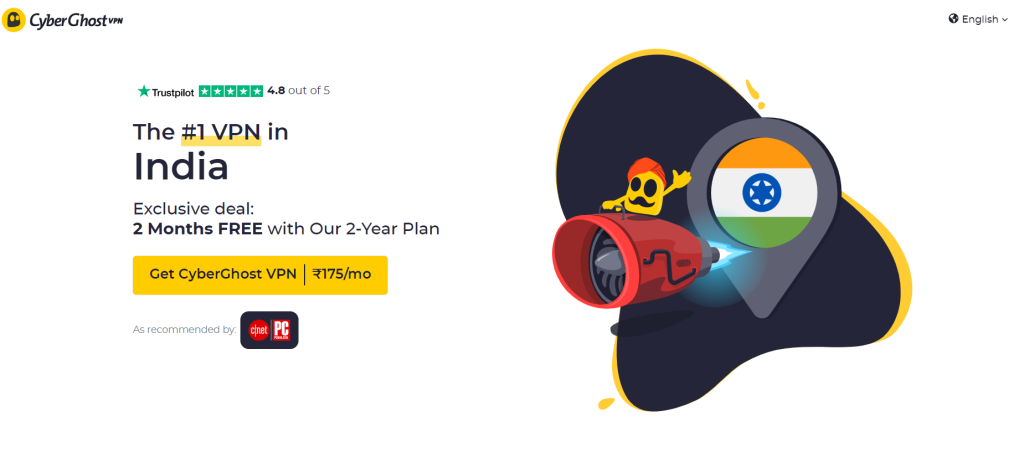
With over 38 million customers, CyberGhost is one of the best VPN services. This VPN provides community-friendly apps, secure VPN connections, and trusted service.
CyberGhost offers split tunneling functionality, has dedicated streaming servers with WiFi protection, over 7,900 servers to access, and uses 256 AES encryption.
You can conveniently connect up to 7 devices simultaneously and enjoy 24/7 live chat support. CyberGhost offers a 48-hour free trial period (no credit card required). However, unlike many other VPNs that offer a 7–31 day money-back guarantee, CyberGhost gives you up to 45 days to decide if their service is the best fit.
Private Internet Access
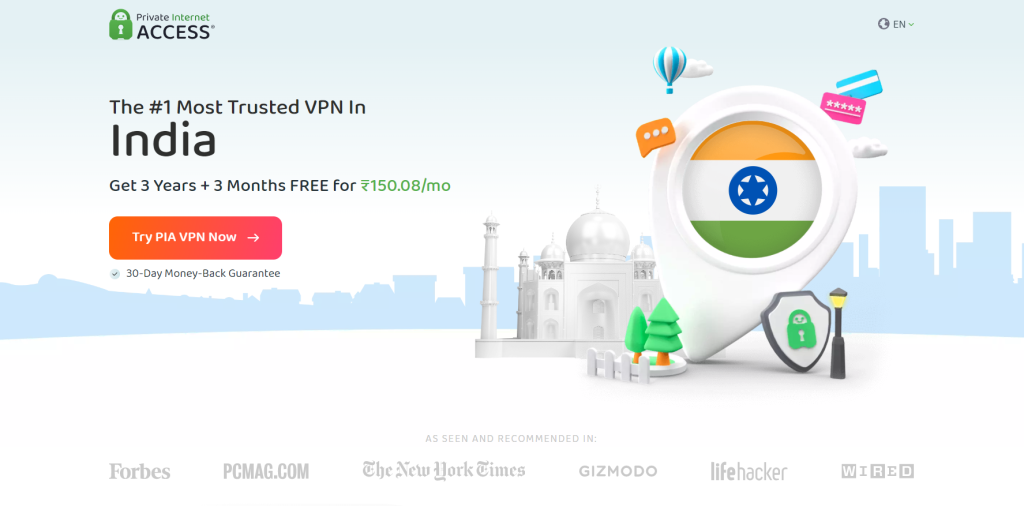
Private Internet Access gives you access to 30,000+ next-generation servers located in 84 countries. PIA lets you use split tunneling, and you can choose between AES-128 (the default level of security) or AES-256 (the highest level of security).
You can connect with up to 10 devices simultaneously with no speed restrictions or data caps, so you can always stream and download as much as you want without worrying about getting charged extra fees for going over your limit!
They have a wide range of protocols available, including OpenVPN, PPTP, and L2TP/IPSec. Private Internet Access offers a 7-day free trial for both Android and iOS and a 30-day money-back guarantee. They also now boast 24/7 live chat services.
ProtonVPN
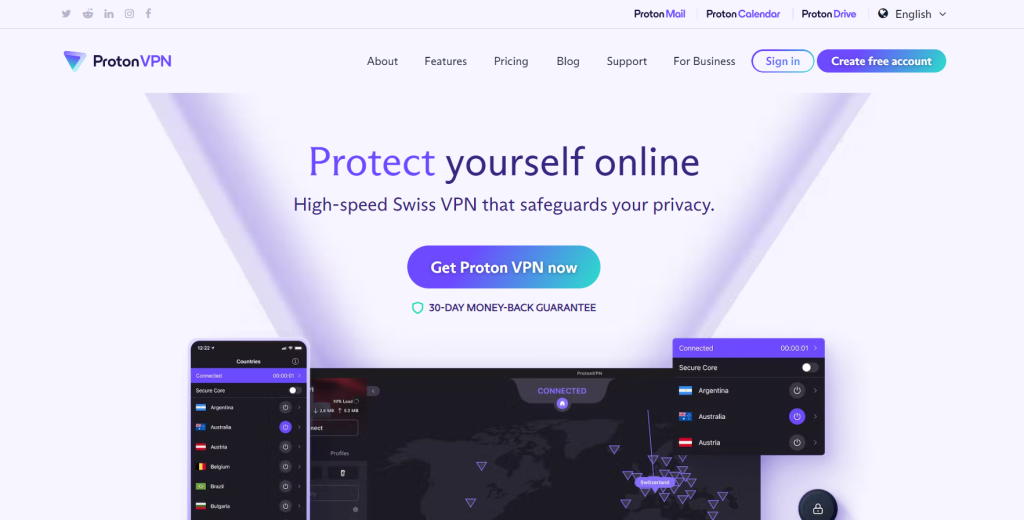
This is a Swiss-based VPN provider that has been around for a long time. Their service has been tested by independent experts to be very reliable and secure, with no leaks. They have 1,700+ servers in 63 countries.
ProtonVPN offers split tunneling functionality and a VPN Accelerator, which is a set of VPN technologies that can increase your VPN speeds by more than 400% while reducing latency and VPN protocols.
This is one of the best VPN services and offers 24/7 customer support via email or live chat through their website. You can connect up to 10 devices on their plus plan, but only one device on their free plan.
While they offer a 7-day free trial and a 30-day money-back guarantee, there’s a catch. You can only get a refund for the “unused portion” of your subscription.
Hotspot Shield
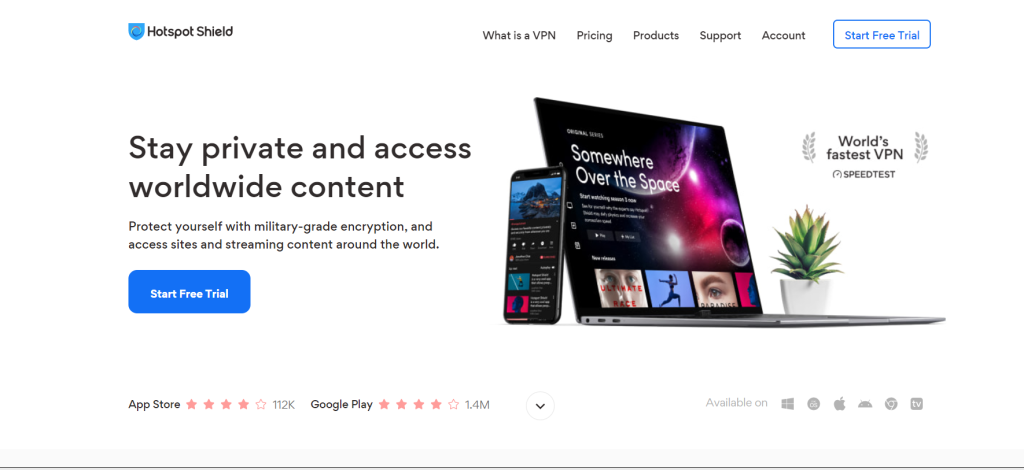
Hotspot Shield is an all-in-one internet security solution that protects your computer, phone, and tablet from viruses, malware, spyware, and other online threats. They have 1,800+ servers in 80+ countries, and you can connect up to 5 devices across multiple devices.
Hotspot Shield is one of the best VPN services around, and it’s easy to see why. It’s affordable, reliable, and has an excellent reputation for keeping your privacy intact! It also offers the split tunneling function for premium subscribers.
With Hotspot Shield, you can get free VPN services but with restrictions. For example, the free plan gives you 500MB of bandwidth per day, but it limits your speed to 2Mbps and makes it easy for ads to target you.
The Best Netflix VPN
Netflix is the most popular streaming service in the world. However, sometimes you can not readily enjoy your favorite movies and shows depending on your geographical location. If you want to be able to watch Netflix anywhere with high reliability and speed, choosing the best VPN for Netflix is important. So, which of the best VPN services is the best Netflix VPN? It’s ExpressVPN.
- ExpressVPN
When selecting your VPN for Netflix, there are certain important factors involved. You should choose the finest VPN available for trouble-free video streaming. While several of the VPNs on the list above would satisfy some of these requirements, there’s one that stands out.
With ExpressVPN, you can enjoy the best streaming experience at any time! One advantage is the strong, vast network of servers (3000+) in 94 countries. This allows you to access international content across all Netflix libraries and get around Netflix’s geographic restrictions.
Additionally, ExpressVPN provides high-quality streams without data constraints or bandwidth restrictions in order to protect your data while streaming your preferred entertainment. And if you run into any streaming-related problems, ExpressVPN offers email and live help services that will get you through in no time.
ExpressVPN also supports a large array of devices, including Windows, Mac, Android, and iOS, so you can stream your entertainment from any device.
The Best VPN for Online Gaming
Sometimes, it’s difficult to find a solid VPN for gaming. You need a service that doesn’t compromise your speed or increase your lag. So, some things go into choosing what can pass as the only VPN in your gaming life.
But which of the best VPN services passes as a gaming VPN? It is NordVPN.
- NordVPN
If you have ever experienced trouble while gaming, then you understand that you definitely want a solution that can protect you strongly from DDoS and throttle attacks. This will give you fast connection speeds. And this is where NordVPN comes in to offer you the best of these features and more.
The NordLynx tunneling protocol (NordVPN’s version of WireGuard), has made it one of the fastest VPN services available. With NordVPN, you get access to 5,500+ servers worldwide and can also enjoy its variety of tunneling protocols, including NordLynx, OpenVPN, and IKEv2.
With NordVPN, there is no restriction on devices, and you can easily connect to a neighboring site to reduce the latency. So, whether you are on a PC, mobile device, or tablet, you can have fun playing your favorite games.
Best Cheap VPN
Sometimes, you find yourself on a tight budget. Even on days like this, you want the greatest bang for your buck. So, what’s the best cheap VPN you can use? The answer? CyberGhost VPN.
- CyberGhost VPN
CyberGhost is one of the most affordable VPNs that’s reliable and can satisfy the needs of any wallet size. With CyberGhost, you can maintain your security and privacy for only $2.23 per month when you choose the three-year contract. You’d also get four months free and save up to 83 percent.
While spending less, you can get the benefits of a top VPN service. For a small price, you can get blazing VPN speeds, over 7,900 server locations in 91 countries, and 256-bit AES encryption, among many other features.
The Best Free VPN
Even if you have no money to spend on a VPN service, there is still a VPN service among the best VPN services for you! There are several VPNs with some excellent features that won’t demand a dime for usage. However, you should note that with a free subscription, you may not have enough functions as a paid service. Free VPNs are ideal for infrequent or casual users. The best free VPN you can use is ProtonVPN.
- Proton VPN
Proton VPN offers a free VPN version that doesn’t keep any logs, has a good unlimited bandwidth plan, and works with a variety of devices. With free ProtonVPN, you also enjoy leak prevention, custom DNS servers, and split tunneling, which are all useful features.
The feature that sets Proton VPN apart from the competition is its unlimited bandwidth delivery; this makes it one of the few free VPNs you can use worry-free. However, the ProtonVPN free version is usually limited in some way—for example, the number of devices you can connect to at a time (you can only connect one device). Also, the speed is not as high as that of ProtonVPN Plus (paid version).
How to Use a VPN?
There are many ways to use a VPN, but the easiest is to connect your computer or mobile device to the VPN server, and then use the Internet as you normally do. If you’re using a desktop computer, you have to download the client software from your VPN provider’s website.
If you don’t have access to a desktop computer or don’t want to use a VPN on your computer, you can use other devices like your smartphone or tablet. To do this, download your VPN software onto your mobile device (such as an Android phone or iPhone). From there, you can set it up and select your desired region, country, and server. Click “Connect” to start the connection process.
How does a VPN work?
A VPN works by using a secure tunnel between your device and the VPN server. What this means is that all of your online activity—including your browsing, email, and social media—is protected from prying eyes and hackers.
The most common type of VPN uses OpenVPN, which uses encryption to ensure that none of your data is accessible to anyone but you and the VPN provider. The best VPN services encrypt your data by scrambling all of your data before it leaves your device and decrypting it when it reaches its destination.
This means that even if someone were to catch a packet of information while it was traveling through their network, they would only be able to see the plain text version of what was inside. This is useless without knowing or having access to the encryption keys.
When Should You Use a VPN? (VPN Services)
- Public networks
Public networks are the most porous and dangerous networks because there’s no encryption. Anyone on the same network as you can see all your traffic and potentially steal your data. A VPN is a great way to encrypt your data on public networks and keep it safe.
- Ecommerce security
When shopping online, especially on large e-commerce sites like Amazon, you need to protect yourself from potential data breaches and identity theft. By using a VPN, you can protect your personal information while still using the site’s services.
- To access international content
Some countries restrict certain websites or services based on location. For example, if you try accessing the Google Play Store from China or North Korea, it will show an error message saying that Google does not support the app in that region. However, with VPNs, you can access such international content.
- To hide identity while researching
A VPN masks the IP address of your device. It does this by routing your traffic through a server in another country, so that it appears to be coming from somewhere else. The server will then act as a proxy for your actual location, so that even if someone was monitoring traffic in real time, they’d be unable to tell where you’re really located.
- App unblocking
A VPN is a great option when you need to unblock content or apps. For example, if you want to play a game that’s not available in your country or if you want to access a website that has been blocked in your area, you can use a VPN.
- Obtain access to geo-blocked streaming content
Your VPN allows you to get around your internet provider’s geographic restrictions. They are a great alternative if you need to access websites that are restricted in your country or region—like some news feeds, entertainment websites, or even Netflix.
- To avoid cookie-based price manipulation
Another great use for VPNs is to avoid cookie-based price manipulation. This occurs when companies use cookies to track your browsing habits, which allows them to charge you higher prices for products and services based on what they think you’re likely to buy based on your browsing history. Using a VPN can prevent this type of tracking, so you can shop with confidence knowing that no one can tell what websites or apps you’ve visited before!
- Avoid hacking
Since a secure tunnel is used by VPNs to connect your device and the VPN server, everything you do on the internet is now secure from prying eyes and hackers—including surfing, e-mail, and social networking. So, when you next think of hackers, think VPN!
- Government censorship
If you’re visiting a country that has strict Internet censorship laws (such as China), it’s often easy to get caught up in them by using your computer as a conduit through which all of your information travels. With VPNs, however, you can keep yourself safe while still giving yourself access to everything else on the web.
Can We Use VPNs for Banking?
The short answer is yes! You can use VPNs for banking when you want to pay bills, send money from one account to another, or even log into a bank website without having to worry about information theft.
So, VPNs are a great option for those who want to secure their financial information and data when they’re online. However, you should only use the best VPN services with encryption standards that meet or exceed those set by major banks.
The Limitations of VPNs
- A VPN may reduce your speed. Because the VPN provider is sharing your connection with other users, the bandwidth of each user is shared between all of them. This can cause slowdowns for some users.
- Connections can be lost. If a user disconnects from the VPN service or turns off their computer before reconnecting, they might lose their connection to the VPN server and have to reconnect.
- Not all countries allow the use of VPNs. Some countries block or limit access to certain websites or services, even if they are hosted on servers inside the country.
- Free or weak VPN services can leak your information to third parties. A malicious hacker could also use this method to steal your personal information.
- The VPN service can keep track of what you do online and use your information for marketing purposes.
Can we trust a VPN?
Since VPNs are not without limitations, can we still trust them? Before choosing which VPN to trust, here are three things you must find out!
- Company headquarters
A VPN service’s headquarters is the most important thing to look at if you want to know where it’s coming from and who runs it. If the company is based in one country but only has servers in another, there may come a time when your data is compromised. This also applies if the servers are located somewhere that isn’t very secure, like China or Russia.
- Their privacy policy
If a VPN service doesn’t have a privacy policy, then there are serious questions about their security practices and the integrity of their network. The best VPN services will have clear policies about how they use your data and how long they keep it for before deleting it forever.
- The encryption methods they use
You need to know the encryption methods a VPN service uses before you can trust them to protect your privacy and personal information. A good VPN provider will use encryption methods that are secure. One of the most secure encryption methods is AES-256. This is used by banks and the military.
Paid vs. Free VPNs: Which Is Better?
The first thing you’ll want to determine is if you want a VPN that’s free or one that costs money. And while it may seem like there should be no difference between them, there actually is!
A free VPN will usually offer basic services and won’t include any extra features, such as advanced encryption or server locations. These can be great for beginners who want to learn about how VPNs work but don’t have the budget for a premium service yet.
But if you’re looking for something more advanced or want to pay for a high-quality service that includes everything from high encryption protocols to unlimited bandwidth options, then a paid VPN is probably what you want.
You should think about how long you’ll be using your VPN before deciding whether it’s worth paying for. If your usage amounts to just a few minutes each day on average, then a free option might be fine—but if you’re going to use it more often than that (or even every day), then paying up could really pay off in the long run.
Also, you have to consider how much encryption you need for your day-to-day use. If you use your credit card a lot online or do financial transactions almost every day, it might be best to invest in a paid VPN service.
How to Choose the Best VPN Service?
When it comes to choosing the best VPN service, you want to make sure that you’re getting a good deal. You don’t want to waste your money on a service that leaves you feeling frustrated or disappointed. And you surely don’t want to get stuck with an unsuitable service that doesn’t work exactly as advertised.
To help you decide which VPN service is right for your needs, we’ve outlined some important things you should consider when choosing a VPN provider:
- VPNs by the Numbers
- Simultaneous connections: The more simultaneous connections that a VPN service offers, the more users it can support at once. This means less strain on the server network and greater performance for everyone involved.
- Availability of servers: The more servers a VPN service has, the more they can keep up with demand and ensure that their customers have easy access to reliable access anywhere in the world.
- Available server locations: Some have server locations across different parts of the world; others only have one or two international locations per country. If servers are not well distributed worldwide, it can make it difficult to get a fast connection while traveling abroad because there might not be any nearby servers available close enough to provide adequate speeds.
- VPN with split tunneling
This feature allows your device to receive all the traffic from your home network—including internet traffic—but only send selected traffic through the VPN. It’s simple: if you want to keep your internet activity private and secure while using public Wi-Fi, use a VPN that has split tunneling enabled.
- Device types
Some VPNs support only one device type, whereas others support multiple device types for different operating systems. For example, a VPN that supports Windows, MacOS, and Android devices will allow users to install and use the app on each device type.
- Browser types
Some VPNs support various browsers, while others are compatible only with specific browsers like Chrome or Firefox. This can make choosing a VPN difficult if you have different browsers installed on multiple devices. However, this can also be solved by installing a third-party browser extension such as Opera.
- Services
Check out the services offered by each provider. Some offer free trial periods that let you test out their services before committing to a longer-term subscription, which can be helpful if you think the price is high or if you want to try before you buy. Also, some offer 24/7 live chat support while others do not.
- Pricing
Is this VPN service affordable and do they have a friendly pricing structure? Some VPN services charge based on your monthly data consumption or the number of devices you connect, while others charge a flat fee. Choose what works best for you.
Our Methodology: How We Chose the Best VPN Services
How did we arrive at our ranking of the best VPN providers? We evaluated the quality of the VPN services based on several criteria. Below is a list of the metrics used.
- Speed
Although almost all VPN services reduce internet speed to some degree, some VPN services do so significantly. We assessed each of the VPN services based on how fast the internet speed was after connecting to the VPN. So, only the fastest VPN providers are on our list.
- Security
By hiding your IP address, VPNs let you secure your personal details like bank accounts, email, and other services from hackers and internet fraudsters. We only chose the VPN services with the best encrypted virtual tunnels that are the safest for this list.
- Subscriptions
You have to balance price and quality so you don’t break the bank to use a VPN. We have selected only the best VPN services that are the best value for money. Also, some of the services on our list offer discounts or even free trials if you sign up for certain plans.
- Performance
You should only settle for a VPN that operates at peak efficiency. Our well-curated selection provides the finest servers available worldwide so that you can connect to any of them wherever you are.
- Customer Support
Whether you’re a seasoned VPN user or using one for the first time, you could run into trouble at some point and require assistance. As a result, you need to opt for a VPN provider that provides live customer support to handle your inquiries. The best VPN services on this list have email support and a 24/7 live chat option.
- Reliability
Failure to unblock sites’ restricted material is a recurring issue that users run into while utilizing some types of VPN. Even if you’re hiding your IP address, certain websites can still block you. This is why we have chosen VPNs that are resistant to DNS breaches and IPv6 leaks.
- Compatibility with various devices and OSs
While some VPNs only support a single device type, others support a variety of device kinds across several operating systems. We ensured that the VPNs on our list work on a variety of platforms, including Windows, MacOS, and Android smartphones. So, you can switch devices as you want.
- Encryption methods
The most secure VPNs use high encryption techniques so that even if a hacker accesses their network, they won’t be able to see what you’re doing online or steal your information. The VPN selection on our list comes with the best encryption method (AES-256).
- Privacy Policy (No Log Policy)
The top VPN services will have transparent privacy practices. We have chosen a list without a data-logging policy. As a result, no record of your internet actions is left, and your internet footprint is non-existent.
| VPN | |||||||
| No of servers | 3000+ across 94 countries | 5500+ across 60 countries | 7900+ across 90 locations | 3200+ across 95 countries | 30,000+ across 84 countries | 1700+ across 63 countries | 1,800+ in 80 countries |
| Simultaneous connections | 5 | 6 | 7 | unlimited | 10 | 10 | 5 |
| Verified logging policy | No logs | No logs | No logs | No logs | No logs | No logs | No logs |
| VPN- protocols | OpenVPN, IKEv2, L2TP/IPsec, Lightway | OpenVPN, IKEv2/IPsec, NordLynx (WireGuard) | OpenVPN, IKEv2, Wireguard | OpenVPN, IKEv2, WireGuard | OpenVPN, PPTP, L2TP/IPSec | OpenVPN, IKEv2, and WireGuard | Hydra, IPSec, and OpenVPN protocols |
| Price (month-to-month) | $12.95 per month | $11.95 per month | $12.99 per month | $12.95 per month | $11.95 per month | free, $4, $8, $24 per month | $12.99 per month |
| Money back guarantee | 30 days | 30 days | 45 days | 30 days | 30 days | 30 days (only unused portion) | 45 days |
| Devices | All devices | All devices | All devices | All devices | Major devices | All devices | Major devices |
| Live chat support | yes | yes | yes | yes | yes | yes | yes |
Conclusion
A VPN doesn’t change where you’re located—it just changes how other people see that location. This is especially important when you’re trying to hide your identity from others or what you’re doing online. You absolutely need to start using a VPN! Choose the best VPN services based on your most pressing needs and budget.
FAQs:
- Are VPNs illegal?
VPNs are not illegal in most countries, but they may not be legal in your country. Check with the government of your country to confirm the legality of VPNs in your area.
- How much does a VPN cost?
The price of a VPN depends on the type of plan you choose and the features that are included with that plan. The best way to find out what your options are is by reading through the client’s website for recent price bonuses or looking at our comparison charts for different types of plans.
- When is the best time to buy a VPN?
You should purchase a VPN as soon as you can. The best time is before hackers get hold of your personal data. There’s no point in waiting for a few weeks or months to stream that video or play that game, you could do it right away.
- Is a VPN good for gaming?
The short answer is yes. A VPN connection offers security and anonymity and helps you play some games without having to worry about latency. With VPNs, it may also be harder for opponents to use denial-of-service (DDoS) attacks to take you offline.
- Are VPNs difficult to use?
VPNs are easy to use once you get the hang of it. The best VPN services allow you to connect your computer directly via an IP address or domain name, so there’s no need to type in complicated IP addresses or port numbers before getting started.
- Can I Use Tor or a Proxy Instead of a VPN?
Tor and proxies are great ways to hide your IP address while connecting to the internet—but they’re not as secure as a real VPN service would be because they don’t encrypt all of your data before sending it over public networks like the Internet (or even over private networks like home Wi-Fi).


